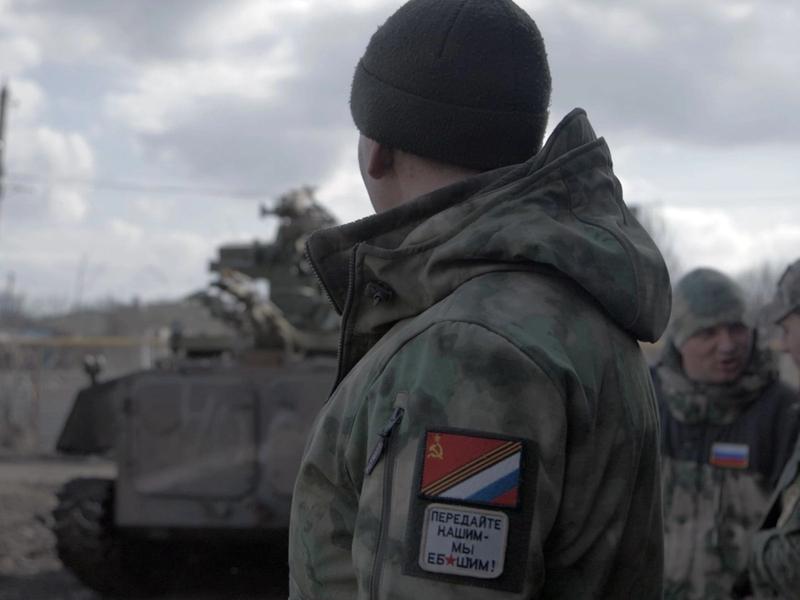

FAQ
How did this production start?
Following Russia’s full-scale invasion of Ukraine, Canadian documentary producer Cornelia Principe contacted filmmaker Anastasia Trofimova, then working as a news producer for the Canadian Broadcasting Corporation's (CBC) Moscow bureau. Having met through mutual colleagues in Canada’s documentary community, Cornelia and Anastasia agreed to work together and explore potential stories for a film.
Anastasia began filming anti-war protests, interviewing human rights lawyers, and documenting the perspectives of returning soldiers and their families. Her initial focus was on both anti-war activists and those directly involved in the fighting. Meanwhile, Cornelia pitched the project to a Canadian broadcaster and France-based producer Sally Blake (Films à Cinq).
In late December 2022, while returning to Moscow by train after filming a family resisting the illegal conscription of their son, Anastasia had a chance encounter with a Russian soldier, Ilya, returning from the front to visit his family for the holidays. This meeting would ultimately determine the direction and focus of the production.
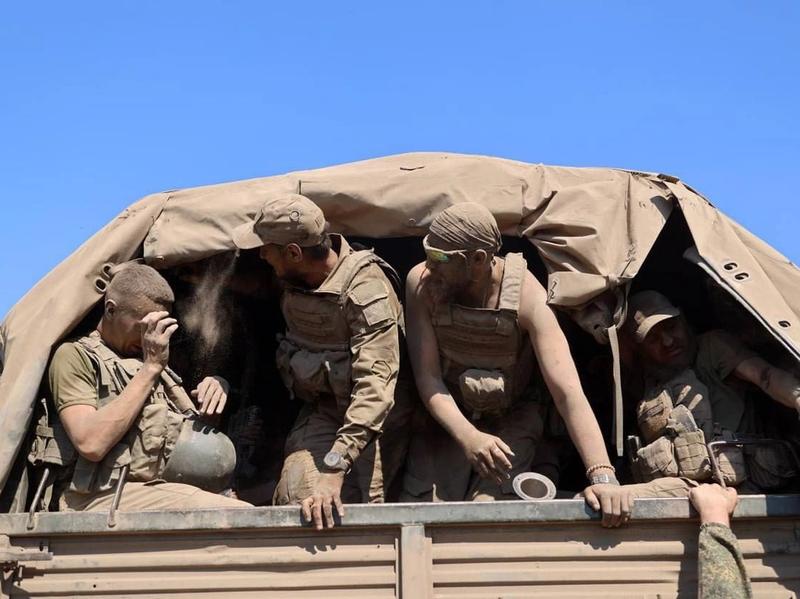
How was Russians at War funded?
Russians at War is an official co-production between Canada (Raja Pictures) and France (Films à Cinq). 70% of the financing was Canadian (including: Knowledge Network, CMF Performance Envelope Program, Rogers Documentary Fund, Hot Docs Ted Rogers Fund, Ontario Creates Tax Credits, Canadian Federal Tax Credits), and 30% of the financing was from France (Films à Cinq).
The project was fully financed through Canadian and French sources, qualifying it as a certified Canada–France treaty co-production. Except for Anastasia’s travel expenses, no funds were spent in Russia. The Canada Media Fund and all other funders have confirmed that the production met all contractual, legal, fiscal, ethical, and professional standards. Russians at War also strictly adheres to Canada's sanctions related to Russia under the Special Economic Measures Act (SEMA).
How did filmmaker Anastasia Trofimova gain access to a Russian battalion, and why was she allowed to stay?
After meeting Ilya on the train and filming him leaving his family in Moscow to return to the front, Anastasia reconnected with him two weeks later. His battalion was stationed near the border to replenish supplies and soldiers. When she asked if she could join, he casually replied, “Why not?” With her experience filming in war zones, Anastasia assumed the conditions would be chaotic enough that she might be able to film Ilya for at least a few days. She slipped through the loosely controlled border as a civilian, without press credentials.
Introducing herself as a documentary filmmaker, Anastasia explained to the soldiers that she wanted to document their daily lives. The supply unit, where Ilya and others accepted her presence, advised her to get approval. The brigade commander, however, was reluctant and wanted to take her to headquarters for official clearance, which would likely result in her expulsion or arrest. She convinced him otherwise, arguing that bureaucrats didn’t understand life on the front and that documenting their reality was incredibly important. He finally relented, saying, “Fine. I didn’t see you. Leave my sight.”
At first, she filmed discreetly inside houses, gradually expanding to the village and training grounds. Some soldiers were wary, but others offered to share their stories. Over time, her presence became normal, and soldiers assumed she had a reason to be there.
When the battalion prepared to return to the front, the brigade commander refused to let her go, saying war was “no place for a girl.” But some of the soldiers, impressed by her determination, suggested she hide in their truck and try her luck at the frontlines "where it's more chaotic." When the brigade commander eventually saw her, he swore at her defiance but seemed too preoccupied with military logistics to deal with the annoyance.
At the front, she first stayed with the supply unit before moving in with the medics. Over four months, she filmed the daily routines of soldiers and their perspectives on the war. Some were struck by the irony that, despite constant media coverage of the war, she was the only journalist among them. Without official Ministry of Defence approval, Anastasia risked arrest at any moment. After four months, she returned to Moscow the same way she had arrived—through civilian transport.
In early summer 2023, Anastasia travelled to Toronto to begin editing. While there, she learned that the battalion was being deployed to Bakhmut, one of the most intense frontlines at the time. Determined to continue their story, she flew back to Moscow in June and took an 18-hour bus trip to a city near Bakhmut.
Upon arrival, she found the situation had changed. The brigade commander who had previously tolerated her presence had been killed in action. His replacement was far less accommodating. After two weeks, he warned her that he would hand her over to the FSB if he saw her again. Undeterred, she stayed a bit longer, avoiding him while filming whenever possible. “The commander didn’t live with the soldiers, so when he was away, I could film. Otherwise, I hid in the woods or dugouts.”
After capturing footage of the battalion’s first “storm offensive,” Anastasia returned to Moscow. In total, Anastasia was embedded with the battalion, on and off, for seven months without clearance or official approval.
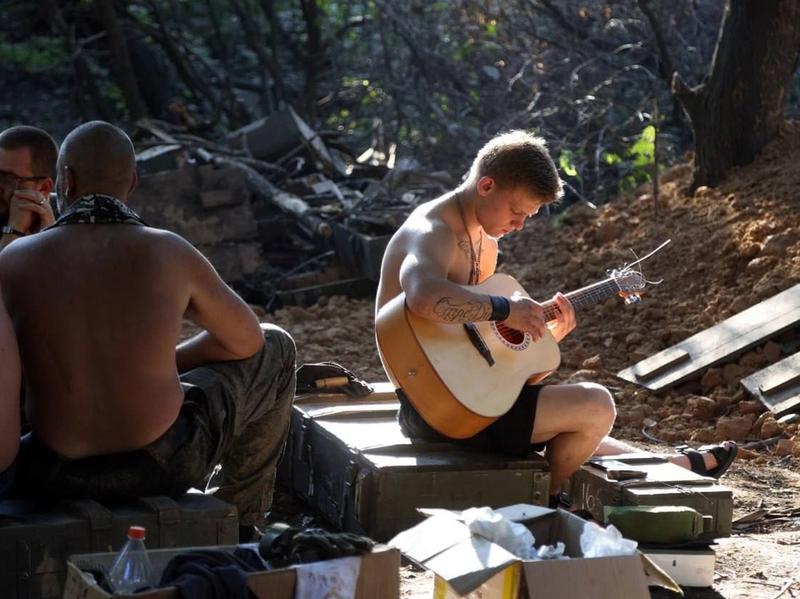
Why did the soldiers featured in Russians at War agree to participate, despite Russian laws prohibiting dissent about the war?
Anastasia was transparent with the soldiers about her intent to create a documentary and the potential risks involved. Some soldiers responded with dark humour, suggesting that the worst consequence would be being sent to the frontlines, where they already were. All participants provided verbal consent on camera, motivated by their frustration with media coverage of the war and a desire to share their personal stories and convey the truth as they experienced it.
To mitigate risks, the documentary uses only first names or military call signs and omits specific battalion numbers and deployment locations. Given the hierarchical nature of the military, responsibility for allowing filming rested with local commanders rather than individual soldiers. Notably, the commander who initially tolerated Anastasia’s presence has since died in combat.
Anastasia also consulted with four Russian military law experts, who reviewed the film before its final cut and affirmed that the soldiers’ narratives did not violate current Russian laws, as they refrained from direct criticism of the state. Two additional legal experts concurred with this assessment. However, Anastasia faces potential legal jeopardy for producing the film. Any plans to screen the documentary within Russia will be approached cautiously, with ongoing consultation with the participants.
Some opponents of the film have argued that including Ilya—a Ukrainian serving in the Russian army—was a deliberate provocation. Why was he featured in the documentary?
As depicted in the film’s opening scene, director Anastasia Trofimova encountered Ilya by chance. His presence provided an unexpected yet authentic entry point into the battalion she documented. Ethical documentary filmmaking involves portraying the filmmaker’s journey and interactions in a transparent manner. Omitting Ilya would have compromised the integrity of this approach.
Since 2014, a small number of Ukrainian citizens have joined pro-Russian separatist groups. Following the 2022 invasion, some ended up as part of the Russian military forces' ranks. Ilya’s decision to volunteer was influenced by financial needs, and cultural, linguistic, or political affiliations with Russia—a complexity reflected in his on-screen commentary. Ilya’s circumstances are not necessarily reflective of all of the Ukrainians fighting within the Russian army. We've included further "outtakes" with Ilya on the film's YouTube channel.
Russians at War is an observational documentary that aims to faithfully represent Anastasia’s experiences within a Russian battalion. It was not intended to be a comprehensive historical analysis or investigation into the broader Russo-Ukrainian conflict.
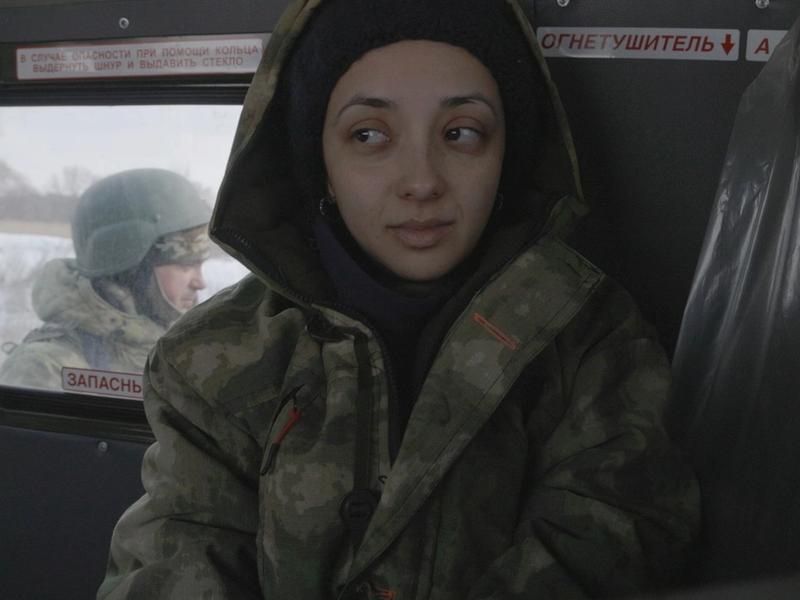
Why have screenings of Russians at War been rescheduled or cancelled at international film festivals?
Russians at War premiered at the Venice Film Festival, closely followed by the Toronto International Film Festival (TIFF). In this website's “Controversy” section, we have detailed how political and social media pressure and threats led to safety concerns at TIFF, where screenings of Russians at War were postponed by several days so that the film could be presented safely and securely.
A similar pattern of threats and intimidation as experienced by TIFF also played out at festivals in Zurich and Athens, with screenings being cancelled at these events due to safety concerns. Both of these festivals maintained their curatorial position and support in selecting Russians at War by allowing the film to remain in their Competitions.
The Mumbai Film Festival (MAMI) informed us, a day before its scheduled screenings, that both Russians at War and No Other Land were denied, at the last minute, the typically perfunctory censor approvals required to publicly exhibit films in India.
The International Documentary Film Festival (IDFA) invited Russians at War well in advance of the world premiere in Venice. However, the festival withdrew its invitation on September 27th, the day following the announcement that the Zurich Film Festival was forced to cancel its screenings due to safety concerns. IDFA’s rationale for its retraction, as expressed by email, was that they “could not guarantee a constructive atmosphere for the film.”
Docville (Leuven, Belgium) invited Russians at War with full awareness of the opposition to the film and IDFA’s withdrawal. We had little direct communication with the festival, except for providing materials, until a few days before the scheduled screenings, when they informed us that they “were forced to cancel the screenings of Russians at War." The festival’s statement suggested their screenings were being cancelled “out of respect for the request of the Ukrainian Embassy.”
Russians at War has been invited to 14 international film festivals and was ultimately presented at 8 of those festivals. Ten of these festivals invited our film before its world premiere, an indication that Russians at War would’ve had an exceptionally wide and long festival run if not for the intense suppression campaign against the film, mostly by individuals, organizations and agencies that had not watched the film.
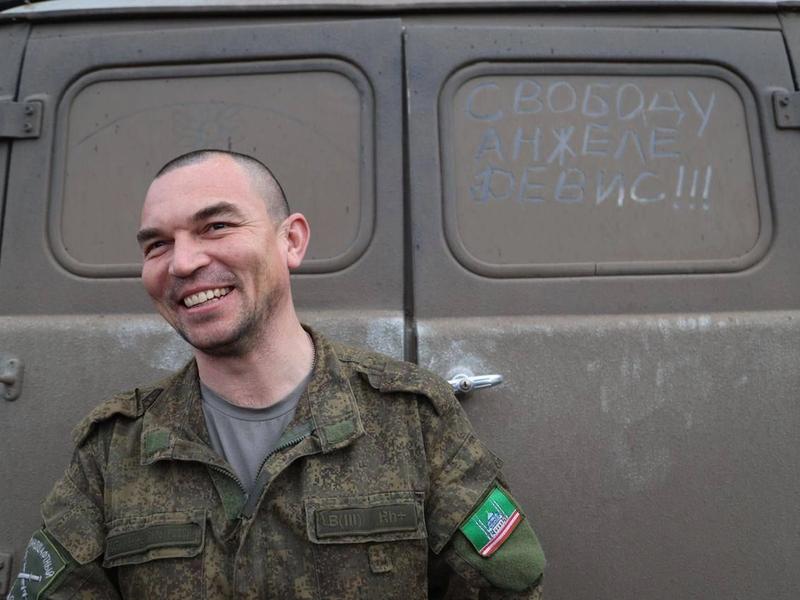
You claim that Russians at War has been "misrepresented." How and why?
Since premiering at the Venice and Toronto film festivals in Fall 2024, Russians at War has been the target of a coordinated global campaign aimed at suppressing its exhibition at film festivals and other venues. This intimidation and disinformation campaign appears to have been initiated by the Ukrainian government and its international agencies and amplified by global allies, aligned media, and online influencers and movements (most notably "NAFO"). Among the tactics of this suppression campaign has been to falsely label this Canada-France co-production as “Russian propaganda.”
Some critics of the film have accused it of “echoing Russian propaganda,” conflating the views of individuals in the film with those of the filmmakers. The production maintains that audiences interested in documentary film are discerning enough to recognize the distinction. Russians at War demonstrates—clearly and without the need for additional exposition—that their government’s propaganda has heavily influenced some of these soldiers.
Another frequent tactic employed to discredit and suppress the production has been misrepresenting Anastasia's employment by Russia Today Documentary (RTD), a subsidiary channel of Russia Today (RT), implying the film was somehow made in association with RTD. This insidious lie is emphatically false.
First, it's essential to note that Anastasia's full biography and professional website, as well as the fact that RTD employed her from September 2014 to July 2020, were available in all submissions to international film festivals and in the production's media materials.
She first met the Commissioning Editor of RTD at the Hot Docs Film Festival in Toronto in April 2014. Anastasia was scouting archival footage of the Lebanese Civil War for her self-funded documentary, Twelve Palestines, about Palestinian refugees. The Commissioning Editor (CE) invited her to the channel’s offices to discuss purchasing film rights and subsequently introduced her to the upper management of RTD, who later offered her employment as a documentary director and cinematographer. Anastasia put forth two conditions: 1) that no narration be added and 2) that no correspondents were to be used. She wanted to make observational, cinema verité-style programmes, to which the channel agreed. She worked primarily in the Middle East and Africa, with a focus on ISIS and portraits of regular people in conflict zones. Her films include: Her War: Women vs. ISIS (about recruits to the Kurdish Women’s Protection Units fighting ISIS in Syria), The Road to Raqqa (on the final weeks of the siege on the ISIS capital), Iraqi Safe House (on the first private orphanage in Baghdad and the children of Iraq’s latest conflicts), Mosul between War and Peace (on revenge and division inside Mosul, a former ISIS stronghold and Iraq’s second largest city), Congo, My Precious (a profile of a Congolese musician, fixer and former United Nations worker and how the conflict mineral wars intertwined with his life) and others.
These films have been translated into five languages (Russian, English, Arabic, Spanish, and French) and have received several awards, including the “Silver Screen Award” from the US International Film and Video Festival (2016) for Her War: Women vs. ISIS. Her film Victims of ISIS was used as supporting material for an asylum application to Europe for Abu Shuja, a Yazidi man who rescued over 500 ISIS sex slaves and, consequently, had a $500,000 bounty on his head placed by the terrorist organization.
Again, most of the productions Anastasia directed for RTD are available on her professional website. Anastasia had left RTD in July 2020, as she indicated to The Globe and Mail, after “the relatively liberal atmosphere in which we were working started to change.” Our understanding is that RTD scrubbed Anastasia's documentaries and mentions of her on its website following the world premiere of Russians at War. We can only conjecture about RTD's motives for doing so.
Anastasia went on to obtain her Master's Degree in International Relations at the University of Amsterdam (September 2020 - July 2021) and was later employed as a producer for the CBC bureau in Moscow (July 2021- July 2022). September 2021-November 2021, she worked as a field producer/researcher for White Pine’s Ice Breaker: The ’72 Summit Series (for which she was nominated for the “Barbara Sears Award for Best Visual Research” at the 2024 Canadian Screen Awards). At the same time, she freelanced as a translator and field producer with several Western outlets, including the New York Times and Washington Post. She has had no association with RTD since leaving in July 2020.
Articles for which Anastasia has a byline:
- Russia Glorifies Its World War II Dead. He Tries to Give Them Decent Burials.
- Inside the Chechen Units Helping to Fight Russia’s War
- War May Be Distant in Moscow, but in One Russian Border City, It’s Real
- In this city, people say Russia must defeat Ukraine and the West at any cost
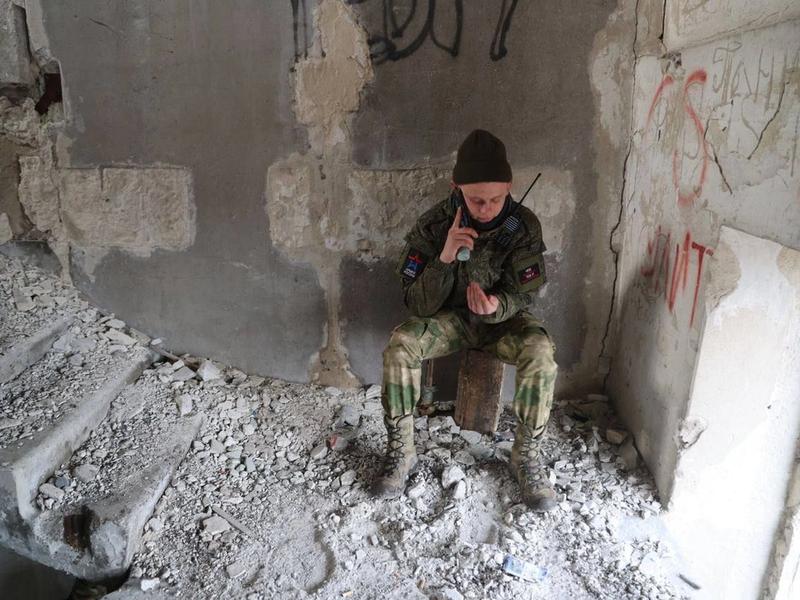
Why does this film not cover the Ukrainian side of the war or provide more context?
Russians at War is an observational portrait of several soldiers in one battalion, filmed by a single filmmaker over one year (2023) of the war. It does not provide an analysis of the historical forces or the current geopolitical dynamics underlying the war. There have been, and will continue to be, many documentary films about the Russo-Ukrainian war. We hope that Russians at War, one small slice of this reality, continues to exist in dialogue with these other works, contributing to our global understanding of the war, including the perspectives of the Russian soldiers documented in our film.
Does this film address war crimes?
The topic of war crimes is addressed in Russians at War, with director Anastasia Trofimova asking questions about the possibility of Russian war crimes to one of the soldiers profiled, who is incredulous to the notion, even with further prodding. That is not the perspective of the filmmaker, nor of the production, but that of one individual in the film.
Anastasia embedded with the battalion at great risk to her safety. She intended to observe and capture the mood and perspectives of the Russian soldiers to whom she had access. The intent of the production was not to investigate war crimes, which would’ve almost certainly led to Anastasia’s expulsion, arrest, or worse. That she did not witness war crimes, as stated in media interviews, is simply a factual response to such questions. The production has released a statement recognizing the validity of the International Criminal Court's ongoing investigation of war crimes.
The battalion in which Anastasia was embedded has not been associated with war crimes in any of the current official and unofficial investigations, to the best of our understanding. It's essential to note that Anastasia was filming with this battalion during the second year of the war, in areas that had been under Russian control for several months.
Did Anastasia enter occupied Ukraine "illegally," as stated by the Ukrainian government and others?
Filmmaking or journalism in an occupied country or warzone - even unauthorized - is not considered a violation of International Humanitarian Law. Freedom of expression and press freedoms are protected under Article 19 of the Universal Declaration of Human Rights as well as the International Covenant on Civil and Political Rights. In the case of an occupied territory, there is ambiguity about which domestic laws apply. To date, neither Anastasia nor the producers have been charged with crimes by Russia or Ukraine. However, Anastasia has been labelled a "threat to Ukraine's national security" by the Ministry of Culture and Strategic Communications of Ukraine.
What has been the reaction to the film in Russia?
There has been no official response, to date, from the Russian government or its agencies.
